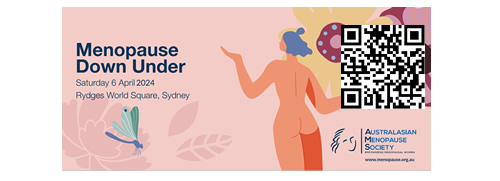11 December, 2017:
Many studies link weight/body mass index (BMI) to breast cancer risk. However, BMI affects risk differently before and after menopause. Before menopause, being overweight or obese modestly decreases breast cancer risk whereas, after menopause, being overweight or obese increases breast cancer risk. Several recent studies have shed light on other relevant perspectives of this link. The Women's Health Initiative trial provided data on the potential association between the metabolic syndrome and breast cancer risk [1]. The evaluated parameters were: blood glucose, triglycerides, HDL cholesterol, blood pressure, waist circumference, and BMI. Women were then classified into six metabolic obesity phenotypes according to their BMI: 18.5 – < 25, 25 – < 30, > 30 kg/m2) and presence of the metabolic syndrome (> three of the following: waist circumference > 88 cm, triglycerides > 150 mg/dl, HDL cholesterol < 50 mg/dl, glucose > 100 mg/dl, and systolic/diastolic blood pressure > 130/85 mmHg or treatment for hypertension). The cohort included about 21,000 postmenopausal women and over 15 years of follow-up; 1176 cases of invasive breast cancer were diagnosed. Obesity, regardless of metabolic health, was associated with increased risk of breast cancer. Being obese and metabolically unhealthy were associated with the highest risk: HR 1.62, 95% CI 1.33–1.96. These associations were stronger in women who had never used hormone therapy. The investigators concluded that, beyond BMI, metabolic health should be considered a clinically relevant and modifiable risk factor for breast cancer.
What about weight changes? Does weight gain increase the risk? Contrarily, will weight loss help to lower the risk of breast cancer? The Nurses' Health Study demonstrated, in a huge cohort, that weight gain after the age of 18 years was unrelated to breast cancer incidence before menopause, but was positively associated with incidence after menopause [2]. This increased risk with weight gain was limited to women who never used postmenopausal hormones; among these women, the relative risk (RR) was 1.99 (95% CI 1.43–2.76) for weight gain of more than 20 kg vs. unchanged weight (p for trend < 0.001). Furthermore, the percentage of postmenopausal breast cancer accounted for by weight gain alone was approximately 16%. The Nurses' Health Study also presented data on the opposite case scenario, namely on weight loss and breast cancer risk [3]. Women who had never used postmenopausal hormones, lost 10.0 kg or more since menopause, and kept the weight off were at a lower risk than those who maintained weight (RR 0.43, 95% CI 0.21–0.86; p = 0.01 for weight loss trend).
Another interesting angle for the association of weight and cancer risk is the consequence of losing weight as a result of a surgical procedure. This becomes even more intriguing with the growing number of bariatric procedures. A new study that looked into this issue found that bariatric surgery was associated with a lower risk of incident cancer, particularly obesity-associated cancers, such as postmenopausal breast cancer, endometrial cancer, and colon cancer [4]. The study was retrospective and included 22,198 patients undergoing bariatric surgery between 2005 and 2012 with follow-up through 2014, using data from a large integrated health insurance and care delivery systems with five study sites. These cases were compared to 66,427 non-surgical subjects matched on sex, age, study site, BMI, and Elixhauser co-morbidity index. After a mean follow-up of 3.5 years, among the obesity-associated cancers, the risk of postmenopausal breast cancer (HR 0.58, 95% CI 0.44–0.77, p < 0.001), colon cancer (HR 0.59, 95% CI 0.36–0.97, p = 0.04), endometrial cancer (HR 0.50, 95% CI 0.37–0.67, p < 0.001), and pancreatic cancer (HR 0.46, 95% CI 0.22–0.97, p = 0.04) was each statistically significantly lower among those who had undergone bariatric surgery compared with matched non-surgical patients.
Overweight and obesity are now defined as one of the most challenging targets for health-care systems. Strategic activities to prevent or treat weight gain usually focus on aspects of cardiovascular and metabolic risks. However, weight-related cancer risk, especially of breast cancer, seems equally important. Menopausal women should be aware of this risk factor, which is modifiable. The impact of weight loss or optimal weight maintenance on breast cancer risk is quite substantial.
Amos Pines
Sackler School of Medicine, Tel-Aviv University, Tel-Aviv, Israel
References
- Kabat GC, Kim MY, Lee JS, et al. Metabolic obesity phenotypes and risk of breast cancer in postmenopausal women. Cancer Epidemiol Biomarkers Prev 2017 Sep 22. Epub ahead of print
http://www.ncbi.nlm.nih.gov/pubmed/28939589 - Huang Z, Hankinson SE, Colditz GA, et al. Dual effects of weight and weight gain on breast cancer risk. JAMA 1997;278:1407-11
http://www.ncbi.nlm.nih.gov/pubmed/9355998 - Eliassen AH, Colditz GA, Rosner B, et al. Adult weight change and risk of postmenopausal breast cancer. JAMA 2006;296:193-201
http://www.ncbi.nlm.nih.gov/pubmed/16835425 - Schauer DP, Feigelson HS, Koebnick C, et al. Bariatric surgery and the risk of cancer in a large multisite cohort. Ann Surg 2017 Sep 21. Epub ahead of print
http://www.ncbi.nlm.nih.gov/pubmed/28938270






